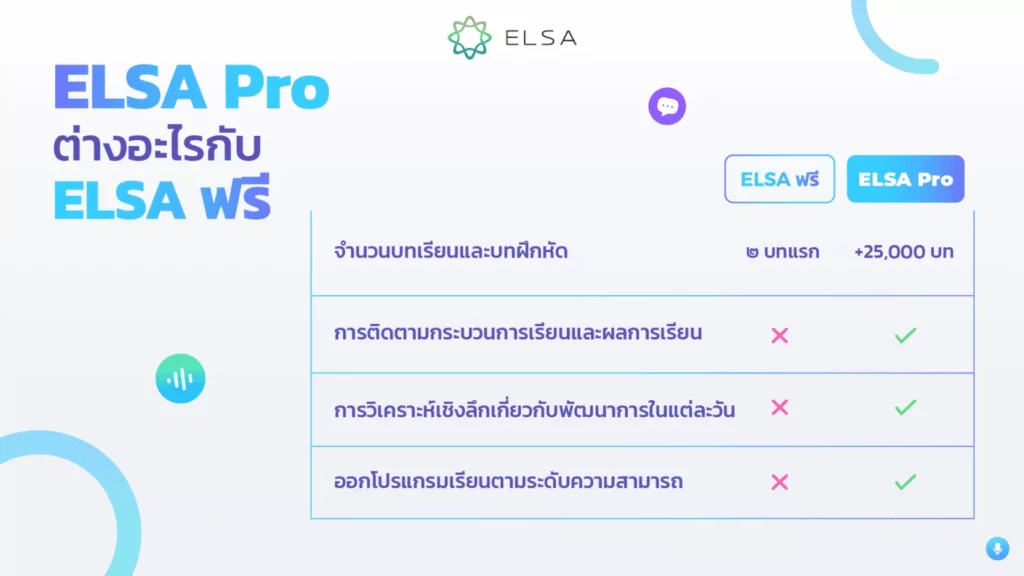Because of, Because และ So ล้วนได้ใช้ในประโยคที่ซับซ้อนเพื่อแสดงความสัมพันธ์ระหว่างเหตุและผล อย่างไรก็ตาม การใช้งานยังมีจุดต่างๆ มากมายที่ผู้เรียนภาษาอังกฤษต้องทราบเพื่อสามารถใช้งานได้ถูกต้อง
ถัดจากบทความเกี่ยวกับคำสันธานภาษาอังกฤษ (Despite, In spite of…) วันนี้ ELSA Speak จะแชร์วิธีแยกแยะคำสันธานสองคำเหล่านี้ ซึ่งมักทำให้ผู้เรียนเกิดความสับสน: So, Because และ Because of มาเริ่มกันเลย!
ความหมาย หน้าที่ และการใช้ Because of, So และ Because
โดยทั่วไปแล้ว ทั้ง So, Because และ Because of ล้วนได้ใช้ในประโยคที่ซับซ้อนเพื่อแสดงความสัมพันธ์ระหว่างเหตุและผล อย่างไรก็ตามมีข้อแตกต่างดังนี้
- ‘Because of’ และ ‘Because’ เน้นหน้าที่แสดงสาเหตุ มีความหมาย “เพราะ/เนื่องจาก/ด้วยเหตุที่…”
- ‘So’ เน้นการแสดงผลลัพธ์ ซึ่งมีความหมาย “ฉันนั้น / ดังนั้น …”
ตัวอย่าง:
(1) Yesterday, Because it rained, we didn’t go camping.
⟶ เนื่องจากเมื่อวานฝนตก พวกเราเลยไม่ได้ไปแค้มปิ้ง
(2) Yesterday, Because of the rain, we didn’t go camping.
⟶ เมื่อวานเนื่องจากฝนตก พวกเราเลยไม่ได้ไปแค้มปิ้ง
(3) Yesterday, it rained, So we didn’t go camping.
⟶ เนื่องจากฝนตกเมื่อวาน ดังนั้นพวกเราไม่ได้ไปแค้มปิ้ง
การวิเคราะห์: ทั้งสามประโยคด้านบนอธิบายเนื้อหาเดียวกันและแสดงความสัมพันธ์เชิงเหตุและผลระหว่าง “ฝนตก” และ “ไม่ได้ไปแค้มปิ้ง” อย่างไรก็ตาม เราจะเห็นว่าในประโยค (1) และ (2) มีการใช้ ‘Because’ กับ ‘Because of’ ซึ่งได้ใช้ในอนุประโยคแสดงสาเหตุเพื่อเน้นสาเหตุ ในขณะเดียวกัน ในประโยค (3) จะใช้ ‘So’ ในอนุประโยคแสดงผลลัพธ์เพื่อเน้นผลลัพธ์
โครงสร้าง Because
Because แปลว่า เพราะ/เนื่องจาก คำสันธาน Because นำหน้าอนุประโยคสาเหตุเพื่อบอกสาเหตุ และมีโครงสร้างดังต่อไปนี้:
Because + Clause 1, Clause 2
หรือ Clause 1 + Because + Clause 2
ตัวอย่าง:
Because she works hard, she earns lots of money.
⟶ เพราะเธอทำงานหนัก เธอจึงได้เงินมากมาย
She earns lots of money Because she works hard.
⟶ เธอหาเงินได้มากมายเพราะเธอทำงานหนัก
โครงสร้าง Because of
Because of หมายถึงเพราะบางสิ่ง แทนที่จะไปกับทั้งอนุประโยค คำบุพบท Because of จะนำหน้าคำนาม นามวลี คำสรรพนาม หรือกริยานาม โดยมีโครงสร้างดังนี้
Because of + (นามวลี) คำนาม/ v-ing, Clause
หรือ Clause + Because of + (นามวลี) คำนาม/ v-ing
ตัวอย่าง:
Because of his good personality, everyone likes him.
⟶ เพราะบุคลิกดีของเขา ใครๆ ก็ชอบเขา
Everyone likes him because of his good personality.
⟶ ทุกคนชอบเขาเพราะบุคลิกดีของเขา
Because of having a good job, she always feels happy.
⟶ เพราะเธอมีงานที่ดีเธอจึงมีความสุขเสมอ
She always feels happy because of having a good job.
⟶ เธอมีความสุขเสมอเพราะมีงานที่ดี
Because และ Because of ใช้ต่างกันอย่างไร
แม้ว่าจะแสดงความหมายเหมือนกัน แต่การแยกแยะ Because & Because of จะช่วยให้เราใช้งานได้อย่างถูกต้องในไวยากรณ์ภาษาอังกฤษ
โดย Because กับ Because of จะแตกต่างกันในโครงสร้าง:
- Because จะนำหน้าอนุประโยคที่อธิบายสาเหตุและเชื่อมโยง Because กับอนุประโยคที่เหลือในประโยคที่ซับซ้อน
- Because of จะนำหน้า (นามวลี) คำนาม หรือ v-ing (หรือวลีที่ขึ้นต้นด้วย v-ing) เพื่อระบุสาเหตุ และเชื่อมต่อ Because of กับอนุประโยคที่เหลือในประโยคที่ซับซ้อน
โครงสร้าง So
ซึ่งแตกต่างจาก Because กับ Because of คุณเพียงสามารถใช้ ‘So’ ต้นอนุประโยคที่ 2 ของประโยคที่ซับซ้อนเท่านั้น และแน่นอนว่าอนุประโยคที่มี ‘So’ นำหน้าจะเป็นอนุประโยคที่อธิบายผลลัพธ์
โครงสร้าง ‘So’:
Clause 1, + So + Clause 2
ตัวอย่าง:
She’s quiet, So they think that she’s unfriendly.
⟶ เธอไม่ค่อยพูดมาก ดังนั้นพวกเขาเลยคิดว่าเธอไม่เป็นมิตร
แยกแยะ Because และ So
หากคุณอ่านข้อ 1 และข้อ 5 อย่างละเอียด คุณอาจจะเห็นความแตกต่างระหว่าง ‘Because’ และ ‘So’ อย่างไรก็ตาม เพื่อช่วยให้คุณเข้าใจมากยิ่งขึ้น ELSA Speak จะยังคงแยกส่วนนี้มาเพื่อเปรียบเทียบคำบุพบททั้งสองนี้ให้คุณ
ความคล้ายคลึงกัน: ทั้ง Because และ So ล้วน นำหน้าอนุประโยคและไม่นำหน้า (นามวลี) คำนามหรือ v-ing เหมือน ‘Because of’
ความแตกต่าง:
- ‘Because’ นำหน้าอนุประโยคสาเหตุเพื่อเน้นสาเหตุ ในขณะเดียวกัน ‘So’ นำหน้าอนุประโยคผลลัพธ์เพื่อเน้นผลลัพธ์
- ‘Because’ สามารถนำหน้าอนุประโยคที่ 1 หรืออนุประโยคที่ 2 ในประโยคที่ซับซ้อน โดยที่ ‘So’ สามารถนำหน้าอนุประโยคที่ 2 เท่านั้น
ตัวอย่าง:
- ประโยคที่มี ‘Because’:
1. Because my mother doesn’t like crowded places, she rarely goes out.
⟶ เพราะแม่ไม่ชอบคนพลุกพล่านจึงไม่ค่อยออกไปข้างนอก
2. My mother rarely goes out Because she doesn’t like crowded places.
⟶ แม่ไม่ค่อยออกไปไหนเพราะแม่ไม่ชอบคนพลุกพล่าน
- ประโยคที่มี ‘So’:
My mother doesn’t like crowded places, So she rarely goes out.
⟶ แม่ไม่ชอบคนพลุกพล่าน ดังนั้นแม่จึงไม่ค่อยออกไปไหน
>>> Read more
- [การ review อย่างละเอียด] App เรียนภาษาอังกฤษสำหรับเด็กดีหรือไม่ราคาเท่าไหร่
- [รีวิวแบบละเอียด] ELSA Speak คืออะไร? แอปฝึกพูดภาษาอังกฤษสำหรับคนทำงานที่มีเวลาน้อย
ข้อผิดพลาดทั่วไปเมื่อใช้ Because – Because of และ So

ใช้ทั้ง ‘Because’ และ ‘So’’ ในประโยคเดียวกัน
ในภาษาไทย เรามักจะใช้ “เพราะว่า” และ “ดังนั้น” ในประโยคเดียวกัน นี่คือสิ่งที่ทำให้ผู้เรียนบางคนติดนิสัยการใช้ทั้ง ‘because’ และ ‘so’ ในประโยคเดียวกันในภาษาอังกฤษ แต่นี่เป็นข้อผิดพลาดทางไวยากรณ์ขั้นพื้นฐานซึ่งเราควรหลีกเลี่ยง ดังนั้นให้จำไว้ว่าเมื่อแสดงเหตุและผลในภาษาอังกฤษ เราจะใช้เพียง ‘because’ หรือ ‘so’ เท่านั้น
ตัวอย่าง:
+ ถูกต้อง:
Because he was tired, he went home early.
He was tired, so he went home early.
+ ผิด: Because he was tired, so he went home early.
ลืมเครื่องหมายจุลภาคในโครงสร้างที่ต้องใช้เครื่องหมายจุลภาค
เมื่ออ่านมาถึงตรงนี้แล้ว คงมีผู้อ่านหลายคนจะลากไปที่ส่วนโครงสร้างอีกครั้งเพื่อดูว่ามีเครื่องหมายจุลภาคตรงไหนบ้าง ในความเป็นจริง การลืมใช้เครื่องหมายจุลภาคในประโยคที่ใช้ ‘Because’ หรือ ‘Because of’ ในอนุประโยคหรือในประโยคที่ใช้ ‘So’ เป็นเรื่องที่พบบ่อย เพราะผู้อ่านจำนวนมากมักแค่อ่านโครงสร้างแบบคร่าวๆ และไม่ค่อยใส่ใจมากเกี่ยวกับเครื่องหมายวรรคตอน
อย่างไรก็ตาม เมื่อเขียนบทความ โดยเฉพาะในการทำข้อสอบ การลืมใช้เครื่องหมายจุลภาคอาจทำให้คุณเสียคะแนนได้ง่าย ดังนั้น ตอนนี้เรามาดูรายละเอียดเพิ่มเติมว่าโครงสร้างใดที่เราต้องใช้เครื่องหมายจุลภาค
ELSA Speak ได้ยกสามตัวอย่างไว้ด้านล่างนี้ นี้คือ 3 ตัวอย่างของ 3 โครงสร้างที่มี Because’, ‘Because of’ และ ‘So’ ที่ต้องมีเครื่องหมายจุลภาคคั่นระหว่างสองอนุประโยค
– Because she behaves politely, everybody likes her.
– Because of her polite behavior, everybody likes her.
– She behaves politely, So everybody likes her.

ใช้ Because และ Because of แทนกันในทางที่ผิด
ตามที่กล่าวไว้ในข้อ 2 ในขณะที่ ‘Because’ นำหน้าอนุประโยค ‘Because of’ จะนำหน้า (นามวลี) คำนามหรือ v-ing
อย่างไรก็ตาม เนื่องจาก ‘Because’ และ ‘Because of’ ดูค่อนข้างคล้ายกัน ผู้เรียนหลายคนมักจะใช้คำเหล่านี้ผิดที่ อย่างเช่น เราใช้ ‘Because’ นำหน้า (นามวลี) คำนามหรือ v-ing และใช้ ‘Because of’ นำหน้าอนุประโยค
ตัวอย่าง:
ประโยคผิด:
Because his broken leg, he couldn’t join that race.
⟶ ‘his broken leg’ เป็นนามวลี ดังนั้นต้องใช้ ‘Because of’ นำหน้า
Because of his leg was broken, he couldn’t join that race.
⟶ ‘his leg was broken’ เป็นอนุประโยค ต้องใช้ ‘Because’ นำหน้า
ประโยคถูกต้อง:
Because of his broken leg, he couldn’t join that race.
Because his leg was broken, he couldn’t join that race.
วิธีเปลี่ยนจากโครงสร้าง Because เป็น Because of
ถ้าหากต้องการเปลี่ยนจากประโยคที่ใช้ ‘Because’ เป็นประโยคที่ใช้ ‘Because of’ เราจะเปลี่ยนเฉพาะประโยคที่ขึ้นต้นด้วย ‘Because’ และอนุประโยคที่เหลือจะยังคงเหมือนเดิม
การเปลี่ยนอนุประโยคที่มี ‘Because’ ขึ้นอยู่กับรูปแบบดั้งเดิมของอนุประโยคนั้น โดยจะมี 8 กรณีทั่วไปดังนี้
Subject (ประธาน) ของสองอนุประโยคเหมือนกัน
ตอนนี้ สำหรับอนุประโยคที่มี ‘Because’ เราจะลบประธานและเปลี่ยนกริยาเป็นรูปแบบ v-ing หมายเหตุว่า ถ้าประธานเป็นชื่อเฉพาะ เราต้องย้ายชื่อเฉพาะนี้ไปถึงอนุประโยคที่เหลือ
ตัวอย่าง:
Because he didn’t work hard, he lost his job.
⟶ Because of not working hard, he lost his job.
⟶ เพราะเขาไม่ขยันทำงาน เขาจึงตกงาน
Because Susan didn’t wear a jacket yesterday, she is sick now.
⟶ Because of not wearing a jacket yesterday, Susan is sick now.
⟶ เนื่องจากซูซานไม่ได้สวมแจ็กเก็ตเมื่อวาน ตอนนี้เธอจึงป่วย
อนุประโยคที่มี ‘Because’ ในรูปแบบ: (นามวลี) คำนาม + be + คำคุณศัพท์
ตอนนี้ เราลบ “be” และวางคำคุณศัพท์ไว้หน้าคำนาม
ตัวอย่าง:
Because the weather was bad, they decided to stay home.
⟶ Because of the bad weather, they decided to stay home.
⟶ เนื่องจากสภาพอากาศไม่ดี พวกเขาจึงตัดสินใจอยู่บ้าน
Because her parents are strict, she Sometimes feels stressed.
⟶ Because of her strict parents, she Sometimes feels stressed.
⟶ เนื่องจากพ่อแม่ของเธอเข้มงวด เธอจึงรู้สึกเครียดในบางครั้ง
อนุประโยคที่มี ‘‘Because’’ ในรูปแบบ: บุรุษสรรพนาม (I, we, you, he, she, it และ they)/ (นามวลี) คำนาม + be + คำคุณศัพท์
ตอนนี้ ถ้าประธานเป็นบุรุษสรรพนาม เราจะเปลี่ยนบุรุษสรรพนามเป็นคำคุณศัพท์แสดงความเป็นเจ้าของที่สอดคล้องกัน ถ้าประธานเป็น (นามวลี) คำนาม เราจะใช้คำแสดงความเป็นเจ้าของ ’s จากนั้นเราก็ลบ be และเปลี่ยนคำคุณศัพท์ให้เป็นคำนาม
ตัวอย่าง:
Because she is unfriendly, they don’t like her.
⟶ Because of her unfriendliness, they don’t like her.
⟶ เพราะเธอไม่เป็นมิตร พวกเขาจึงไม่ชอบเธอ
My boss doesn’t like that employee Because he is lazy.
⟶ My boss doesn’t like that employee Because of his laziness.
⟶ เจ้านายของฉันไม่ชอบพนักงานคนนั้นเพราะเขาขี้เกียจ
อนุประโยคที่มี ‘Because’ ในรูปแบบ: บุรุษสรรพนาม (I, we, you, he, she, it และ they)/(นามวลี) คำนาม + คำกริยา + คำวิเศษณ์
ตอนนี้ ถ้าประธานเป็นบุรุษสรรพนาม เราจะเปลี่ยนบุรุษสรรพนามเป็นคำคุณศัพท์แสดงความเป็นเจ้าของที่สอดคล้องกัน ถ้าประธานเป็น (นามวลี) คำนาม เราจะใช้คำแสดงความเป็นเจ้าของ ’s จากนั้นเราเปลี่ยนคำกริยาเป็นคำนามและคำวิเศษณ์เป็นคำคุณศัพท์และวางไว้ข้างหน้าคำนาม
ตัวอย่าง:
Because behaved badly, she was mad at him.
⟶ Because of his bad behavior, she was mad at him.
⟶ เพราะความประพฤติไม่ดีของเขา เธอจึงโกรธเขา
Because her boyfriend drove carelessly, they are now in hospital.
⟶ Because of her boyfriend’s careless driving, they are now in hospital.
⟶ เนื่องจากแฟนของเธอขับรถโดยประมาท ตอนนี้พวกเขาอยู่ที่โรงพยาบาล
อนุประโยคที่มี ‘Because’ ในรูปแบบ: There + be + (นามวลี) คำนาม
ตอนนี้ เราจะลบ there + be ออก
ตัวอย่าง:
Because there was a traffic jam, we got to the meeting late.
⟶ Because of a traffic jam, we got to the meeting late.
⟶ เนื่องจากรถติด เราจึงไปประชุมสาย
I’m not healthy Because there is a problem with my lifestyle.
⟶ I’m not healthy Because of a problem with my lifestyle.
⟶ ฉันมีสุขภาพไม่แข็งแรงเพราะมีปัญหาในการใช้ชีวิต
อนุประโยคที่มี ‘Because’ ในรูปแบบ: it + be + คำคุณศัพท์บอก weather
ตอนนี้ เราจะลบ be และเปลี่ยนคำคุณศัพท์ให้เป็นคำนาม แล้วเติม ‘the’ นำหน้าคำนาม
ตัวอย่าง:
Yesterday, we couldn’t go to the zoo Because it was rainy.
⟶ Yesterday, we couldn’t go to the zoo Because of the rain.
⟶ เมื่อวานเราไม่สามารถไปสวนสัตว์ได้เนื่องจากฝนตก
อนุประโยคที่มี ‘Because’ ในรูปแบบ: (นามวลี) คำนาม + be + V3/Ved (กรรมวาจก)
ตอนนี้ เราจะเปลี่ยน V3/Ved เป็นคำนาม โดยเติม ‘the’ ข้างหน้าและ ‘of’ ตามหลัง และ (นามวลี) คำนามที่เป็นประธานในตอนแรกจะถูกเลื่อนลงหลังจาก ‘of’
ตัวอย่าง:
Because dishwashers were invented, lots of people don’t have to wash the dishes themselves.
⟶ Because of the invention of dishwashers, lots of people don’t have to wash the dishes themselves.
⟶ เนื่องจากการคิดค้นเครื่องล้างจาน หลายคนไม่ต้องล้างจานด้วยตัวเอง
วิธีที่ง่ายที่สุด: แทน ‘Because’ ด้วย ‘Because of’ จากนั้นเติม ‘the fact that’ และไว้อนุประโยคที่เหลือเป็นเหมือนเดิม
ตัวอย่าง:
Because I don’t have many friends, I sometimes feel lonely.
⟶ Because of the fact that I don’t have many friends, I sometimes feel lonely.
⟶ เพราะฉันมีเพื่อนน้อยคน ฉันเลยรู้สึกเหงาในบางครั้ง
ดูวิดีโอไวยากรณ์เกี่ยวกับ Because และ Because of:
แบบฝึกหัด: So Because และ Because of ใช้ยังไง
ใส่ ‘Because’ หรือ ‘Because of’ ในตำแหน่งที่เหมาะสม
1. ……………….. not feeling well, he left the company early.
2. I don’t really trust him ……………….. he seems dishonest.
3. You shouldn’t stay up late ……………….. it’s not good for your health.
4. ……………….. his small room, he can’t adopt a dog.
5. ……………….. my younger brother is inactive, he rarely exercises.
6. ……………….. my son went to bed late last night, he is late for school today.
7. Yesterday, I woke up in the middle of the night ……………….. a strange noise.
8. Last week, she couldn’t take part in that singing competition ……………….. her sore throat.
9. ……………….. his impatience, he easily gives up.
10. His younger sister is hungry now ……………….. she skipped breakfast this morning.
คำตอบ:
| 1. Because of | 6. Because |
| 2. because | 7. because of |
| 3. because | 8. because of |
| 4. Because of | 9. because of |
| 5. Because | 10. because |
ใส่ ‘Because’ หรือ ‘So’ ในตำแหน่งที่เหมาะสม
1. ………………… she is always busy, she can’t spend time with her family.
2. I didn’t choose that dress ……………….. I didn’t like the color.
3. My younger brother doesn’t get enough sleep, ……………….. he always feels tired.
4. They live far from their school, ……………….. they have to get up early every day.
5. His elder sister feels exhausted now ……………….. she has swum for nearly 1 hour.
6. Her husband laughed too loudly, ……………….. the baby woke up and cried.
7. ……………….. I don’t like crowded places, I rarely go to coffee shops.
8. Two weeks ago, I bought lots of clothes, ……………….. I’m out of money now.
9. I don’t really like this city ……………….. it’s crowded and polluted.
10. I don’t really like this city, ……………….. I have decided to move to another.
คำตอบ:
| 1. Because | 6. so |
| 2. because | 7. Because |
| 3. so | 8. so |
| 4. so | 9. because |
| 5. because | 10. so |
เปลี่ยนประโยคที่ใช้ ‘Because’ เป็นประโยคที่ใช้ ‘Because of’
1. I went to work late this morning because the traffic was heavy.
⟶ …………………………………………………. because of ………………………………………………….
2. My brother never exercises because he is lazy.
⟶ …………………………………………………. because of ………………………………………………….
3. Because that employee is honest, our boss really likes her.
⟶ Because of …………………………………………………., ………………………………………………….
4. Because he didn’t think carefully when doing the Math exercises, he made lots of mistakes.
⟶ Because of …………………………………………………., ………………………………………………….
5. Our parents didn’t let us go out last night because it was stormy.
⟶ …………………………………………………. because of ………………………………………………….
6. We won’t rent this house because the neighborhood is noisy.
⟶ …………………………………………………. because of ………………………………………………….
7. Last week, because she worked too hard, she felt stressed and tired.
⟶ Last week, because of ……………………………………………, ………………………………………
8. Because that employee is irresponsible, she lost her job.
⟶ Because of …………………………………………………., ………………………………………………….
9. Because the environment is polluted, our health is getting worse.
⟶ Because of …………………………………………………., ………………………………………………….
10. This morning, because I left my phone at home, I couldn’t contact my customers.
⟶ This morning, because of …………………………………………., …………………………………….
คำตอบ:
1. I went to work late this morning because of the heavy traffic.
2. My brother never exercises because of his laziness.
3. Because of that employee’s honesty, our boss really likes her.
4. Because of not thinking carefully when doing the Math exercises, he made lots of mistakes.
5. Our parents didn’t let us go out last night because of the storm.
6. We won’t rent this house because of the noisy neighborhood.
7. Last week, because of working too hard, she felt stressed and tired.
8. Because of that employee’s irresponsibility, she lost her job.
9. Because of the polluted environment, our health is getting worse.
10. This morning, because of leaving my phone at home, I couldn’t contact my customers.
ด้านบนคือสรุปความรู้เกี่ยวกับการแยกแยะ ‘Because’ – ‘Because of’ และ ‘So’ ด้วยแบบฝึกหัดและคำตอบ ELSA Speak หวังว่าบทความนี้จะช่วยให้คุณใช้คำสันธานเหล่านี้ได้อย่างมั่นใจและถูกต้อง ขอบคุณที่อ่านบทความ แล้วพบกันใหม่ในบทความหน้า!
ให้เยี่ยมชมเว็บไซต์ ELSA Speak เป็นประจำเพื่อรับความรู้เพิ่มเติมเกี่ยวกับการศึกษาการสื่อสารภาษาอังกฤษด้วยตนเองสำหรับคนวัยทำงานและวัยเรียน!









